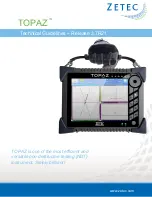
- 19 -
③.
Adjust the escaper notch position.
Turn the power switch ON while covering the sensor light axis.
When the power is ON, the screw sensor LED lights up and the escaper
motor moves around to the back, to the starting point. (Reference point
run.)
When the escaper motor is at the reference point, the escaper doesn't
move.
When it is not at the starting point, the escaper motor moves oppositely
around to return to the starting point and then stops. (Reference point
run.)
※
Before adjustment, the starting point for the escaper motor and the position
of the escaper notch are not the same.
※
A reference point run is the detecting of the starting point of the escaper
motor rotation.
※
Cover the sensor's optical axis with a piece of paper.
When the power is on, the escaper motor has the ability to remain
stationary.
Make a reference point run-and-stop and when the escaper motor is
stationary, then you can align the position of an escaper notch with the
rail groove.
Fine adjustments can be made for the clearance between the end of the
rail and the escaper by loosening the screws, on either side of the center
of the escaper, and moving the escaper to an ideal position.
Remember to tighten the screws again.
After adjustment, turn the power switch OFF/ON in order to make a
reference point run and check that an escaper notch and the rail
groove align.
After, remove the paper blocking the sensor's optical axis and the
escaper will start rotating.
Check that all 4 notches of the escaper, each in rotation, stop at the rail
groove.
Escaper
Oval hole
[Reference] It is possible to adjust the groove section as you adjust
the position of the escaper bracket. Refer to number
②
on page 18.
・
There must not be any contact between the rail and the robot escaper guide.
・
The escaper top surface should be the same height as the rail top surface or
slightly lower.
You can make fine adjustments for width clearance between the end
of the rail and the escaper.
Also, you can make fine adjustments for height clearance between
the rail surface and the escaper surface.
Escaper bracket
attaching bolt
Fine adjustment
(Note:
②
)
Adjust an escaper notch position by
loosening the screws and roatating the
escaper.
Cover the sensor’s optical axis with paper.
















































